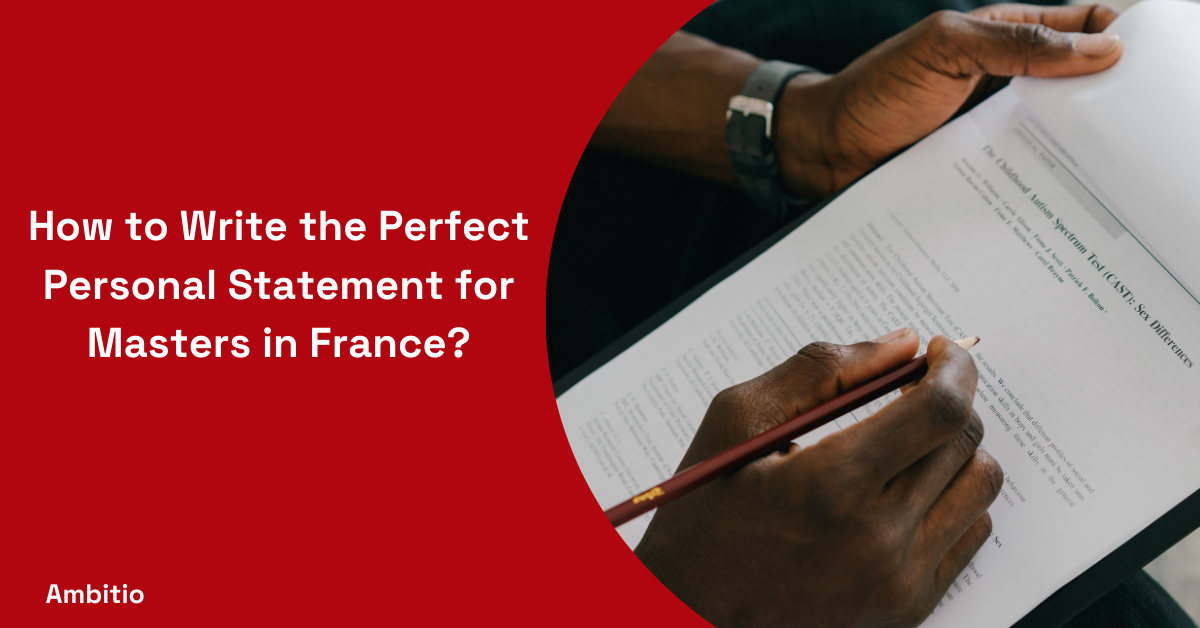12 April 2025
5 minutes read
How to Write the Perfect Personal Statement for Masters in France?

Key Takeaways:
- Personal statement for masters in France is crucial for showcasing your passion, fit, and motivations for the programme you’re applying to.
- Avoid generic content: Tailor your statement to reflect your unique background and align with the programme’s goals.
- Top French universities offer strong programmes with competitive fees and excellent post-graduation salaries, so perfect your personal statement to stand out.
Nearly 90% of rejected applications to French universities are due to poorly written personal statement or unclear motivation letters. Sounds harsh? It’s true, and if you’re applying for a master’s or PhD in France, the pressure to demonstrate not just your academic background but also your passion, clarity, and cultural fit is real.
Most applicants copy templates, list achievements like a resume, or write like they’re sending a letter for a job application. That doesn’t work here. A personal statement for masters in France needs to communicate who you are, why you want to study in France, and how you’re a perfect fit for the programme you’re applying to.
Why a Personal Statement Matters for Masters in France?
A personal statement for masters in France is crucial because it gives the admissions officer a glimpse into your passion, motivation, and suitability for the programme. Whether you’re applying for French literature, studying modern languages, or a multicultural department, your statement should showcase your genuine interest in the subject. It’s not just about academic achievements or work experience; it’s about demonstrating your enthusiasm and why studying French at university aligns with your future goals.

The right personal statement provides a clear overview of your background, from your language skills to your volunteer experiences and summer school involvement. It’s your chance to leave a lasting impression on the admissions officer. A good draft will effectively communicate your knowledge of French culture and history, making you stand out as an applicant ready to contribute to the faculty and get to know the department’s values.
Key Elements to Include in Your French Personal Statement for Masters
Writing a personal statement for masters in France is not just a formality, it’s your opportunity to make a lasting impression on the admissions committee. A good statement of purpose provides more than a list of achievements; it paints a picture of who you are and why you’re passionate about studying French at university.

Here are the key elements to include when crafting your statement:
- Introduction to Your Passion – Begin by explaining why you’re passionate about studying French. Connect your interest in French history, literature, or culture to your academic background.
- Relevant Work Experience – Highlight any work experience or volunteer roles that relate to your field of study. This could include projects, internships, or events that demonstrate your dedication to the subject.
- Academic Background – Discuss your undergraduate studies and how they’ve prepared you for this master’s programme. Mention any coursework that aligns with the programme you’re applying to.
- Fit for the Programme – Show how your skills and interests align with the university’s department. Mention any faculty members whose work excites you and how their expertise can help you achieve your academic goals.
- Clear Conclusion – Wrap up your personal statement with a summary of your goals. Explain why you’re a perfect fit for the programme and how this opportunity will shape your future.
Remember, a French personal statement example can be helpful, but make sure you give yourself plenty of time to edit and refine your first draft. The university application process is competitive, so clarity, good writing, and a well-structured personal statement can make all the difference.
Common Mistakes to Avoid When Writing a Personal Statement
When writing a personal statement for masters in France, it’s essential to avoid common pitfalls that could weaken your application. Here are a few mistakes to steer clear of:
- Lack of Focus – A personal statement is a short document, so avoid going off-topic. Make sure every sentence relates to your motivations, academic background, and why you’re passionate about studying French at university.
- Listing Achievements without Context – Simply listing accomplishments from your undergraduate personal statement doesn’t convey how they align with the programme you’re applying for. Make sure to explain how each experience has helped you gain an understanding of the subject.
- Poor Organisation – A disorganised statement can confuse the admissions officer. Structure your personal statement for masters in France logically, from introduction to conclusion, with each paragraph flowing smoothly into the next.
- Generic Content – Avoid generic phrases that don’t highlight your unique qualifications. Personal statements need to reflect who you are, your interests, and your fit for the programme—so don’t use the same content from previous applications.
- Rushing the Draft – Give yourself plenty of time to write and edit your personal statement. A rushed first draft will likely miss key points or lack clarity. Proper editing ensures a more compelling and well-polished application.
By avoiding these mistakes, you’ll make a stronger impression on the admissions team and improve your chances of securing a place in the programme.
10 Top Universities for Masters Programme in France
French education is renowned for its academic rigor, with the country hosting some of the world’s most prestigious universities. France consistently ranks as one of the top destinations for international students, offering high-quality master’s programmes in various fields, from engineering to business and the arts.
The combination of a rich academic tradition, diverse culture, and attractive post-graduation opportunities makes France a top choice for students worldwide. Here are 10 top universities for master’s programmes in France:
| University | Average Tuition Fees (EUR/year) | Average Salary After Graduation (EUR/year) | Exams Required |
|---|---|---|---|
| Université PSL (Paris Sciences et Lettres) | 10,000 – 13,000 | 35,000 – 45,000 | GRE, TOEFL/IELTS |
| Université Sorbonne (Paris) | 8,000 – 12,000 | 30,000 – 38,000 | TOEFL/IELTS |
| École Normale Supérieure (ENS Paris) | 8,000 – 15,000 | 40,000 – 50,000 | GRE, TOEFL/IELTS |
| HEC Paris | 15,000 – 30,000 | 60,000 – 90,000 | GMAT, TOEFL/IELTS |
| École Polytechnique (X) | 12,000 – 20,000 | 45,000 – 55,000 | GRE, TOEFL/IELTS |
| INSEAD | 30,000 – 40,000 | 90,000 – 120,000 | GMAT, TOEFL/IELTS |
| Université Grenoble Alpes | 9,000 – 11,000 | 32,000 – 38,000 | TOEFL/IELTS |
| Université Aix-Marseille | 8,000 – 10,000 | 35,000 – 40,000 | TOEFL/IELTS |
| Sciences Po Paris | 12,000 – 18,000 | 40,000 – 50,000 | GRE, TOEFL/IELTS |
| Université de Lyon | 6,000 – 10,000 | 30,000 – 35,000 | TOEFL/IELTS |
Conclusion
Writing a compelling personal statement for masters in France is crucial to making a strong impression on the admissions committee. It’s your chance to showcase not only your academic qualifications but also your passion, motivations, and fit for the program. By focusing on your personal experiences and aligning them with the university’s goals, you can set yourself apart from other applicants.
Need help crafting the perfect statement? At Ambitio, we specialize in guiding students through the application process. Get expert assistance today and increase your chances of securing your spot at top French universities!
FAQs
What is a personal statement for a Master’s application?
It’s an essay showcasing your motivation, experiences, and suitability for the program.
How is a Master’s personal statement different from an undergraduate one?
It focuses more on academic depth, professional experiences, and career goals.
What should be included in a personal statement for Masters in France?
Include motivation, relevant experiences, skills, and alignment with future goals.
How long should a Master’s personal statement be?
Typically 500–750 words or 1–2 pages, depending on university guidelines.
How should the personal statement be structured?
Use an introduction, motivation, experiences, and future goals format.
What are common mistakes to avoid when writing a personal statement?
Avoid generic phrases, listing achievements without context, and being inauthentic.
How can I tailor my personal statement for studying in France?
Mention your interest in French culture, specific modules, or unique university offerings.

You can study at top universities worldwide!
Get expert tips and tricks to get into top universities with a free expert session.
Book Your Free 30-Minute Session Now! Book a call now




























